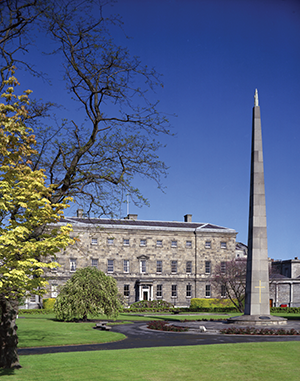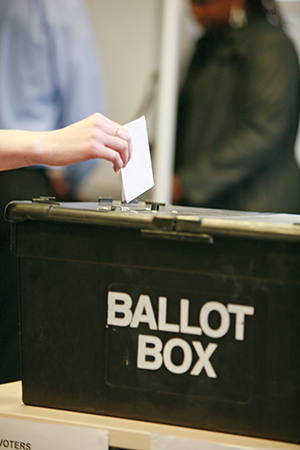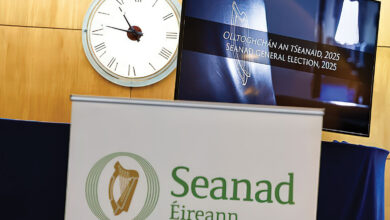Political coalitions

eolas takes a look at the latest developments across the Irish political spectrum.
In the run up to the general election, the Irish political landscape has changed somewhat with the creation of new parties and alliances but just what is the current state of play?
New party
July saw the launch of a new political party, the Social Democrats. The party’s three founder members are independent TDs, Stephen Donnelly TD (Wicklow), Catherine Murphy TD (Kildare North) and Róisín Shortall (Dublin North-West). In the run up to the election, the Social Democrats will have what it calls a “shared leadership” with the party’s leader to be chosen by the parliamentary party following the election. Until then, if an impasse arises, the three founding members will vote to decide on the party’s position.
At the party’s launch, Stephen Donnelly TD revealed that the party was conceived at a meeting over coffee in Shortall’s kitchen last January. All three founders of the party believe the Irish people deserve more than they are currently getting. They hope to see the new party deliver a “new vision with fresh ideas and better approaches.” The party has four core principles, they are:
• progress: the Social Democrats believe that a strong society requires a thriving economy, high-quality public services and vibrant communities. This means they will support Irish SMEs as well as international businesses in creating “good” jobs. They also believe that Ireland’s public services must be accessible, provide high standards of service and run efficiently;
• equality: the Social Democrats feel that in order to ensure everyone has the ability to reach their full potential, investment in community and social infrastructure is required. They want to see civil and religious liberties, human rights and the free media protected. They also want to see a continuation of the progress made on cultural, economic and social rights across the country;
 • democracy: believing in a competent, inclusive, open system of government, the Social Democrats want to see a political system and culture that promotes transparency and accountability in political and administrative decision making. They believe the current system must change so citizens can play full roles in civic and political life;
• democracy: believing in a competent, inclusive, open system of government, the Social Democrats want to see a political system and culture that promotes transparency and accountability in political and administrative decision making. They believe the current system must change so citizens can play full roles in civic and political life;
• sustainability: The Social Democrats want to see a society that is economically, socially and environmentally sustainable. They believe that at present, Ireland is lurching from one electoral cycle to the next with little regard for a long term view and it wants to change this to ensure our environment is safeguarded for future generations.
From these core principles, the party’s priorities are to improve the mortgage-to-rent scheme, introduce a flexible rate regime that includes factors other than property values and bring an end to zero-hour contracts for workers. The party also want to see the establishment of an electoral watchdog and abolish water charges. Donnelly has also stated the party’s intent to ensure that the country’s water system remains publically owned.
Electoral alliance
The Anti-Austerity Alliance and People Before Profit have joined forces to form a new left wing grouping that is targeting at least seven seats in the upcoming general election. The target of seven seats was decided upon thanks to a standing order that grants full speaking rights in the Dáil Éireann to a parliamentary grouping that has seven or more TDs. Political parties with at least two per cent of the national vote also receive additional funding from the state for their political activities.
The grouping, which will be known as Anti-Austerity Alliance-People Before Profit (AAA-PBP), plans to contest 27 constituencies. TDs Richard Boyd Barret (Dún Laoghaire), Paul Murphy (Dublin South-West) and Ruth Copinger (Dublin West) are the alliance’s most prominent members but at present 28 local councillors are also affiliated with the grouping.
The alliance is not the creation of a new political party, both the the Anti-Austerity Alliance and People Before Profit will organise separately and remain free to maintain different political positions on various issues but they will co-operate electorally while maintaining their own identities and structures.
Speaking about the alliance, Boyd Barret TD expressed his confidence that people on the ground would greet this change with enthusiasm and claimed it gave voters a real chance to break away from “failed austerity policies and the failed political establishment.” He also said that for the first time, voters will have a real alternative to Labour. “For the first time in the history of Irish politics, there is going to be a substantial national force to the left of the Labour Party offering people a serious alternative to austerity.”
The AAA-PBP has also signed up to the new Right2Change policy document.

Right2Change
Right2Change is a collection of unions, politicians and groups opposed to water charges. Ahead of the election they plan to build up a strong left-wing pact. This pact will, it is hoped, take the form of a voting transfer pact although many parties who agree with the movements policy documents have rejected the idea. For their part Sinn Féin, a party who often struggles to pick up vote transfers, has agreed to join the pact. Its deputy leader, Mary Lou McDonald TD has also confirmed that the party will be asking its supporters to pass on their second and third preference votes to candidates who have also signed up to the policy document produced by Right2Change.
Speaking about the policy document, McDonald said that rather than replace any party’s manifesto it represented the “points of commonality” where they agree and presents a real opportunity to maximise the number of progressive TDs elected to the Dáil. The document proposals include the abolition of water charges, changes to EU fiscal rules, the elimination of the deficit by 2020, a doubling of public investment and higher taxes on wealth. However, despite the support of Sinn Féin and independent TDs, it is unclear if other left wing parties will follow in their footsteps.
Whilst having signed up to the policy document, the AAA-PBP have formally ruled out a voting transfer pact with Sinn Féin while the Social Democrats have confirmed they will not be joining the initiative, preferring instead to stand as a wholly independent party at the next election.
Ireland’s right
Formed by Lucinda Creighton TD (Dublin South East), Renua Ireland, aims to build a transparent accountable state based on ethics, integrity and the reward of merit. However, the fledgling party has recently conceded something of an own goal after the publication of a new book by the party’s Communications Director, John Drennan.
In the book, written before his decision to take up his position in Renua Ireland, Drennan comments on all political parties but notes that high among Renua’s shortcomings is an over-reliance on their party leader a former Fine Gael junior EU affairs minister. “Luncinda is good,” he writes. “But she cannot be the goal-keeper, full back, centre back, centre forward, full forward and supply the ball.” This reliance coupled, with a lack of grizzled political veterans gives Renua, according to Drenna, the air of a “children’s crusade.” However, he has recently attempted to suggest that such revelations have no bearing on the state of the party today and that his words were written last summer.
Renus’s competition, the Independent Alliance, led by Shane Ross TD (Dublin South), has introduced new legislation to the Dáil in a bid to change the current political system. At present, any candidate who is not a member of a registered political party is listed as representing a “non-party” not as an independent. This system, Ross feels, puts independents at a disadvantage. Ross also wants broadcasters to be allowed to carry party political broadcasts from independents, something they are not allowed to under current regulations.
Before the New Year, the loose alliance of TDs met with lawyers in Leinster House to assess how they could make these adjustments, with high court action not ruled out. The Alliance was formed in March 2015 and comprises of TDs Shane Ross (Dublin South), Michael Fitzmaurice (Rosscommon – South Leitrim), Finian McGrath (Dublin North-Central), John Halligan (Waterford) and Tom Fleming (Kerry South). Senators Feargal Quinn and Gerard Craughwell are also affiliated to the alliance.
However one TD who will not be joining the Alliance according to Sinn Féin leader Gerry Adams is Sandra McLellan TD. The Cork East representative has decided not to run for Sinn Féin following allegations of bullying and amid reports she had met with Halligan to discuss joining the Independent Alliance.
However, Adams who confirmed that he had not spoken to the TD about the bullying allegations confirmed that she had informed him she is not interested in joining the independent alliance. “She told me she was in a very brief informal conversation with John Halligan,” Adams said. “He raised the issue of joining this Independent Alliance and she told me she had never any intention of doing so.”





